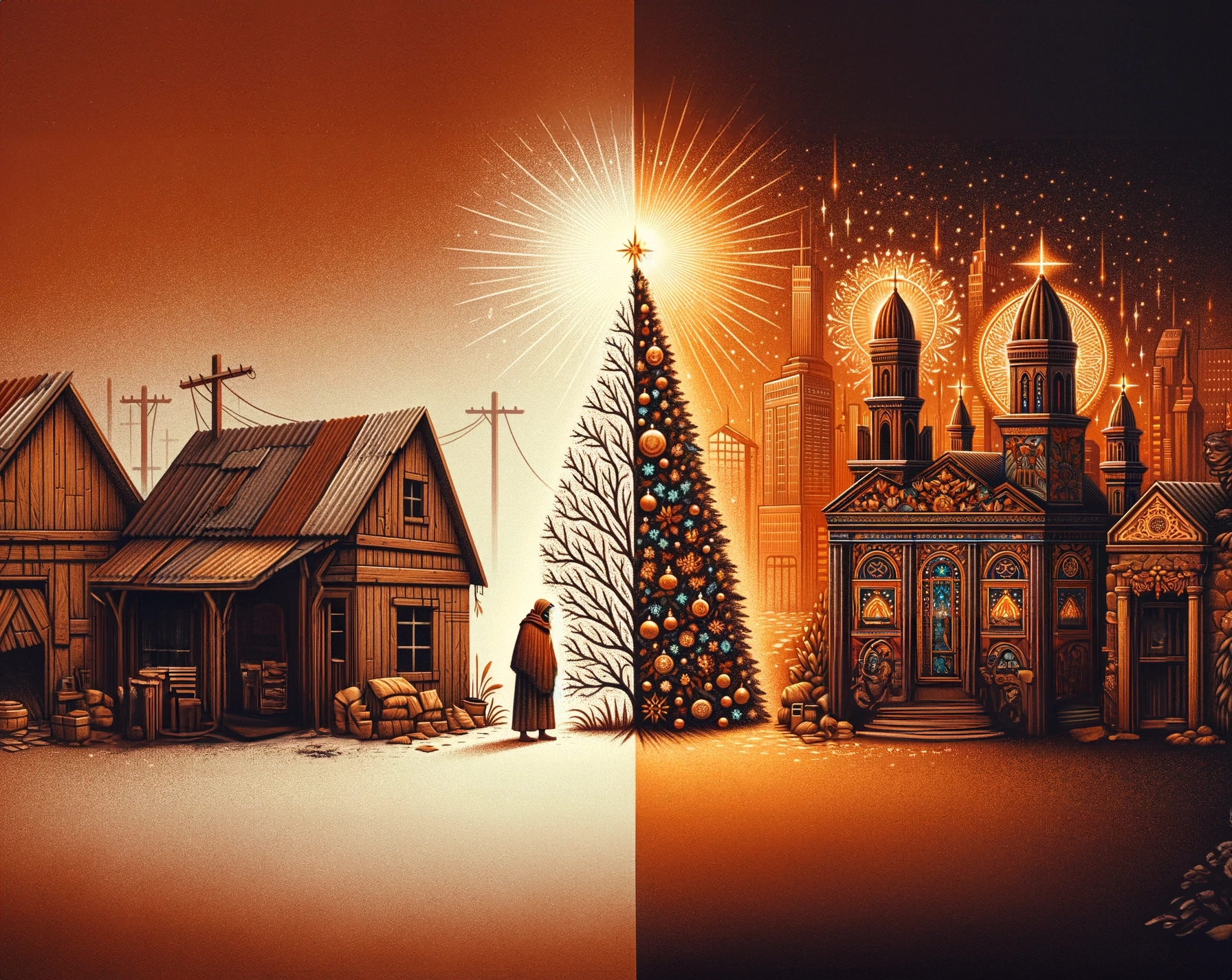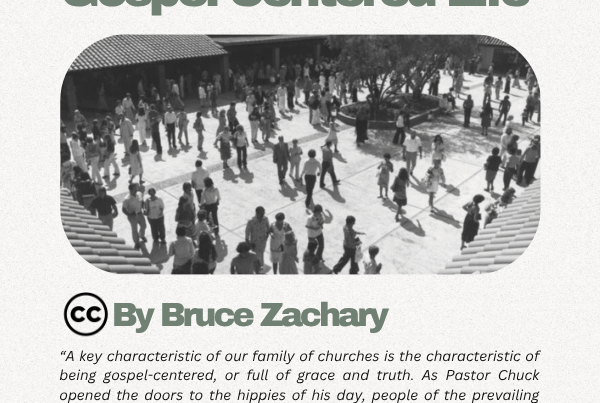
It’s amazing how different our modern Christmas is from what Mary and Joseph experienced. We have holiday sales, ugly sweater contests, family gatherings, Christmas lists, apple cider, gift wrapping, and all sorts of traditions we like to celebrate. And to be sure, I don’t believe there’s anything inherently wrong with these things. In fact, I look forward to many of them every year. But they do tempt us to miss the reality of the incarnation.
The First Christmas
That first Christmas was much different for Mary and Joseph than our version of Christmas. Most of us learn the traditional Christmas story about how Jesus was born in a manger, and we sing songs about it and view it in this romanticized light. But at the heart of this story is the reality that Mary and Joseph were poor, and as a result, Jesus was born into this world essentially homeless. When the God of the universe decided to clothe Himself in humanity and come into our world, He did so as poor, dirty, and homeless.
Luke tells us in his Gospel that when Joseph and Mary went to dedicate the baby Jesus in Jerusalem, they couldn’t afford what was considered the normal offering. Furthermore, in the vast wisdom and sovereignty of the Almighty, when He announces the birth of the Savior, He does so to shepherds. To give you some idea of how shepherds were viewed in Joseph and Mary’s society in those days, shepherd’s testimonies weren’t even accepted in a court of law. They were considered ceremonially unclean, cut off from the religious life of the people. They were marginalized and outcasts, essentially a voiceless and despised group.
The God of the universe chose to come into this world as part of the poor and homeless and marginalized. He chose to identify with those in such circumstances. The story of Jesus and His birth is the story of the impoverished and marginalized becoming an integral part of the most important event in human history. It’s the story of the Almighty condescending from His heavenly throne to intimately participate in the lives of the poor, dirty, and despondent. It’s the story of you and I. Regardless of our financial situations, we are the poor, dirty, and outcast. Sin has made us that way. The incarnation means the King of all kings has chosen to identify with us; He chose to enter our dirty, sin-infested world, to take upon Himself our poverty, all to lavish on us the riches of His heavenly kingdom.
Humanity: From Dust To Glory
Poverty and glory—this is the dichotomy that is woven throughout the incarnation and throughout humanity’s existence. When we celebrate Christmas, we are meant to be confronted with this reality. And not just in the sentimental “oh, that’s a warm thought” kind of way. We are meant to come face-to-face with the King of Glory, clothing Himself in the dirt and dust of humanity.
In Genesis 2:7, we are told that God created mankind from the dust of the ground: “And the LORD God formed man of the dust of the ground and breathed into his nostrils the breath of life; and man became a living soul.” Poverty and glory. We were literally the dust of the ground until the living breath of God changed everything. Suddenly, we are given the unfathomable gift of becoming a living soul. But not just a living soul; we are given the glory of being His image bearers.
The original language for “breathed into” in Genesis 2:7 paints a telling picture. God didn’t just cause Adam to suddenly begin breathing. God got up-close, face-to-face, to give His own life breath to Adam (the way someone giving CPR uses their own breath to inflate the lungs of someone else). God leans into Adam’s lifeless body, nothing more than a clump of dirt, and transfers His eternal breath of life into Adam’s lungs. As Adam’s eyes open, the first thing he would have seen upon becoming a living soul would have been the face of his loving Creator looking back at him. The first thing Adam is aware of is God, and it is from this gazing into the face of God that Adam’s identity is formed. He was a true image bearer. Eventually, sin caused his gaze (and subsequently our gaze) to become self-focused, and as a result, mankind has stayed self-focused ever since.
The Incarnation: Rediscovering Who We Are
The incarnation is about God giving us back our identity. It is an opportunity for us to shift our gaze back into the loving eyes of our Creator. Everything about the birth, life, death, resurrection, and ascension of Jesus has to do with God’s first interaction with Adam: that first moment when they looked each other in the eyes and man became an image bearer of his Creator. Why is God concerned with the outcast, the downtrodden, the voiceless, the hopeless, the marginalized? He is concerned because we are His image bearers. To bear His image is to embrace the reality of this dichotomy of poverty and glory.
We are nothing, made from the dust of the earth, yet God breathed His breath of life into us and made us His image bearers. The lowest of creation, literally dirt, suddenly becomes the image bearer of the only self-existent One. No other creature gets that privilege. Not animals or angels or powers or principalities. And the glory and honor of that privilege is not elevated nor diminished by our finances or social status or job title or worldly accomplishments or anything else. The more we realize our true poverty, the more we will realize our true importance and glory as His image bearers. But if we try to realize our true importance, our true identity, without acknowledging our true poverty, we will find neither identity nor glory.
The Path to True Image Bearing
When the God of the universe incarnated Himself and came into our world to show us once again what it means to be a true image bearer, He did so in such a way that we would be forced to reckon with this dichotomy of poverty and glory. The birth story of Jesus of Nazareth forces us to reckon with the fact that Jesus was born into poverty. The King of the universe, the One who created everything, embraced the full reality of the poverty of being human so that we might know and enjoy forever the full reality of the glory of being His image bearers.
In Genesis, the poverty of man in his state as simply dust particles is transcended by the importance and glory of the life imparted to him by the God of the universe. What once had little value, being merely the dirt of the ground, was suddenly and forever changed into the very reflection of the One who is of utmost prominence and importance. The value of the gift given to us is based on the value of the source from which it comes. We are His image bearers. When He came to earth, He came to show us what it means to be a true image bearer. He came to restore us to our intended position as His image bearers.
In my flesh I’m impoverished, simply the dust of the ground. But because of Jesus, I’m now the temple of the Holy Spirit, the very abode of the Living God, and I get the important privilege of reflecting Him to the world around me. The incarnation reminds us that He made our story His own story as well. At the heart of the Christmas story is the story of poverty and glory.










